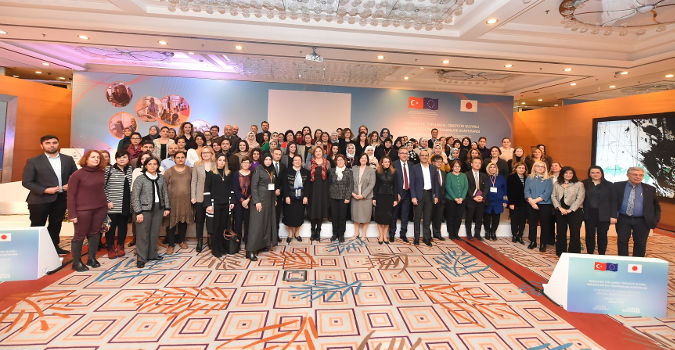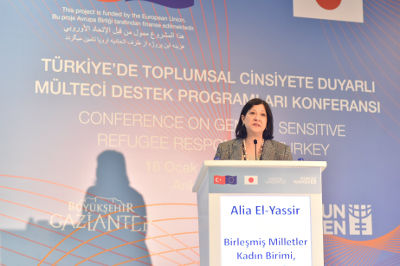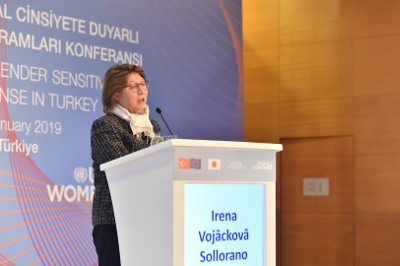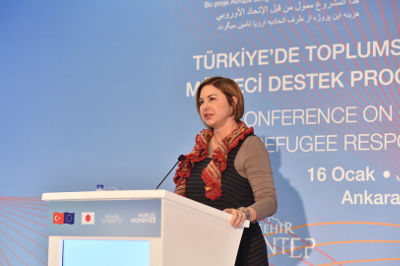Press Release: UN Women spotlighted gender equality as key to refugee response and humanitarian action
Turkey hosts over 4 million Syrian refugees and 70 per cent of them are women and children. The International Conference hosted by UN Women in Turkey emphasized the importance of placing gender equality at the heart of refugee response and humanitarian action.Date:

UN Women organized a high-level international conference in Ankara, Turkey’s capital, on 16 January in partnership with Gaziantep Metropolitan Municipality, and with the financial support of the European Union (EU) Regional Trust Fund for Syrian Refugees. High-level representatives from the UN, the European Union and the donor community, public institutions, national and international civil society organizations, local authorities, experts, women refugee rights advocates, and refugee women attended the conference.
The conference highlighted the importance of ensuring gender-sensitive refugee response and advocating for greater involvement of refugee women and women from the host communities in decision-making and planning processes.
"Gender equality is a key aspect of the EU's global engagement. This conference is very timely, as the EU continues to support refugees and host communities alike in Turkey; with the second €3 billion package a strong gender-sensitive approach will foster equality and ensure that we leave no one behind," said Ambassador Christian Berger, the Head of the EU Delegation to Turkey.
30 Syrian women refugees from different cities of Turkey attended the conference and they discussed the main challenges they face. They also participated in the conference workshops sharing their points of view on gender-sensitive refugee response.
The conference has been organized in the context of the regional project “Strengthening the Resilience of Women and Girls and Host Communities in Iraq, Jordan and Turkey” funded by the European Union Regional Trust Fund for Syrian Refugees, the Government of Japan and the Government of Iceland. The project is implemented by UN Women, in partnership with Gaziantep Metropolitan Municipality, International Labour Organization and Association for Asylum Seekers and Migrants in Turkey. The project focuses on the economic empowerment of refugee and host community women by enhancing their skills, qualifications and income opportunities while providing them with immediate and longer-term protection services. By February 2020, a minimum 5000 women will have benefited from the project.

“Gender equality and women’s empowerment have been recognized as accelerators to reach the Sustainable Development Goals and women’s and girls’ rights must be front and centre in the achievement of the Sustainable Development Agenda. Globally, migrant and refugee women face unique challenges and discrimination. Gender equality is the key to a better future across borders and languages. As part of our global mandate to ensure gender equality in humanitarian crisis, UN Women has been taking action to address women’s persisting needs in Turkey since 2017.” emphasized Alia El-Yassir, UN Women Regional Director for Europe and Central and Representative to Turkey in her opening speech.

Irena Vojáčková-Sollorano, UN Resident Coordinator to Turkey stated in her speech that gender- sensitive refugee response efforts are very important and active centers like the SADA Women Empowerment and Solidarity Centre, set up by UN Women in Gaziantep serving both refugee women and women from the host community, is crucial for peace and social cohesion. She also emphasized the importance of solidarity between women and men for the achievement of gender equality.
"As the Gaziantep Metropolitan Municipality, we are hosting 400 thousand refugees. We have not remained indifferent to this humanitarian tragedy. We took support and assist women and children to cope with the difficult conditions they are in," said Abdullah Aksoy, the Deputy Secretary of General of the Gaziantep Metropolitan Municipality.
"The Japanese Government will continue to support refugee response, gender equality and women's empowerment programmes and we’d like to thank to our partners for the achievements of this programme,” said Yoichi Mikami, Counsellor from the Japanese Embassy.

"For EU, it is of particular importance to support refugees in Turkey and also support Turkish government's efforts to help 4 million refugees. EU is supporting humanitarian and development side of refugee response programmes. We hope that with the support of all the partners, Syrian populations and different stakeholders, we achieve significant results and impacts to help most vulnerable women and men" said Simona Gatti, Minister Counsellor, Delegation of the European Union to Turkey.
“We provide assistance and implement many projects to integrate refugees into social life. Particularly, we are mobilizing all our means to prevent violence against women refugees," said Gülser Ustaoğlu, Head of General Directorate of Women's Status, Ministry of Family, Labour and Social Services.
Turkey hosts over 4 million Syrian refugees and 70 per cent are women and children. According to the Needs Assessment Report of Syrian Women and Girls in Turkey issued by UN Women in 2018 “too many women live below the poverty thresholds, challenged to engage with economic life due to household and care obligations, lack of knowledge of Turkish and employability skills.” The assessment found that 70 per cent of Syrian women do not speak Turkish, creating limitations to their access to rights, services, employment and interaction with the host community.
During the conference, best practices in gender-sensitive refugee response from UN Women, Turkey, Japan, Portugal and Jordan have been showcased. A refugee children’s choir took the stage with bilingual songs in Turkish and Arabic and a photo exhibition with refugee women’s messages has been displayed.
Thordis Sigurdardottir, the Director of Humanitarian Affairs and Policy at the Ministry for Foreign Affairs in Iceland; Vera Eloi da Fonseca, Representative of the High Commission for Migration in Portugal made presentations at panels showcasing best practices in gender-sensitive refugee response.
For further information:
Pınar Alkan Yarıkkaya
532 294 19 07 / pinar.yarikkaya@unwomen.org